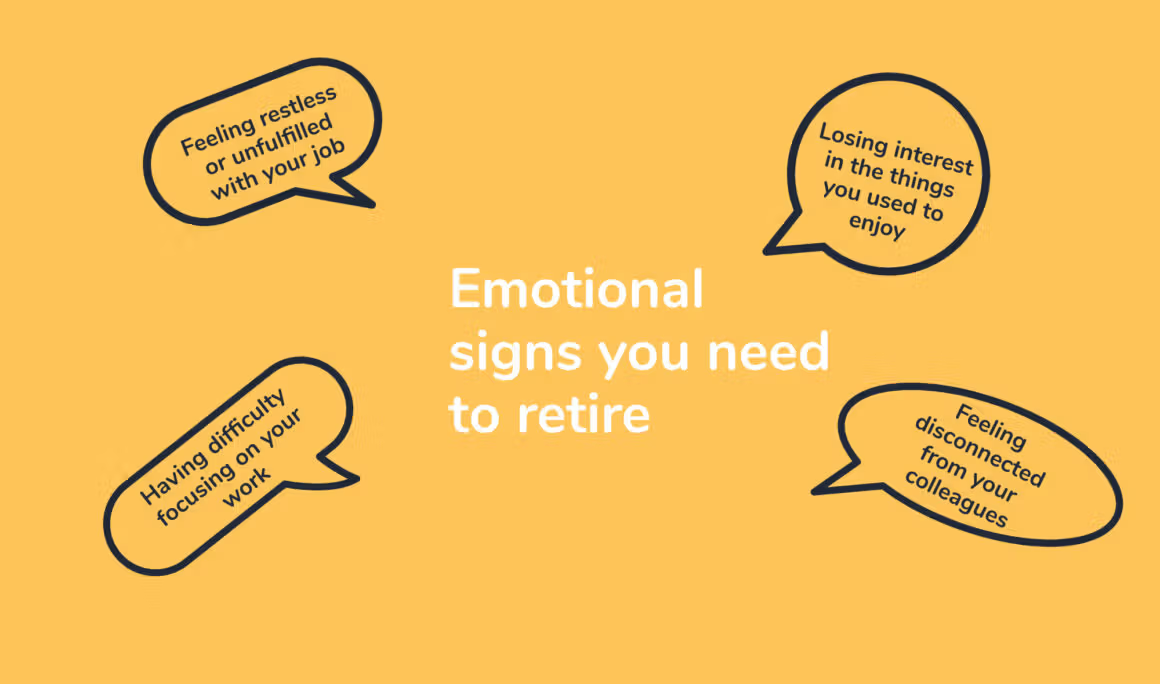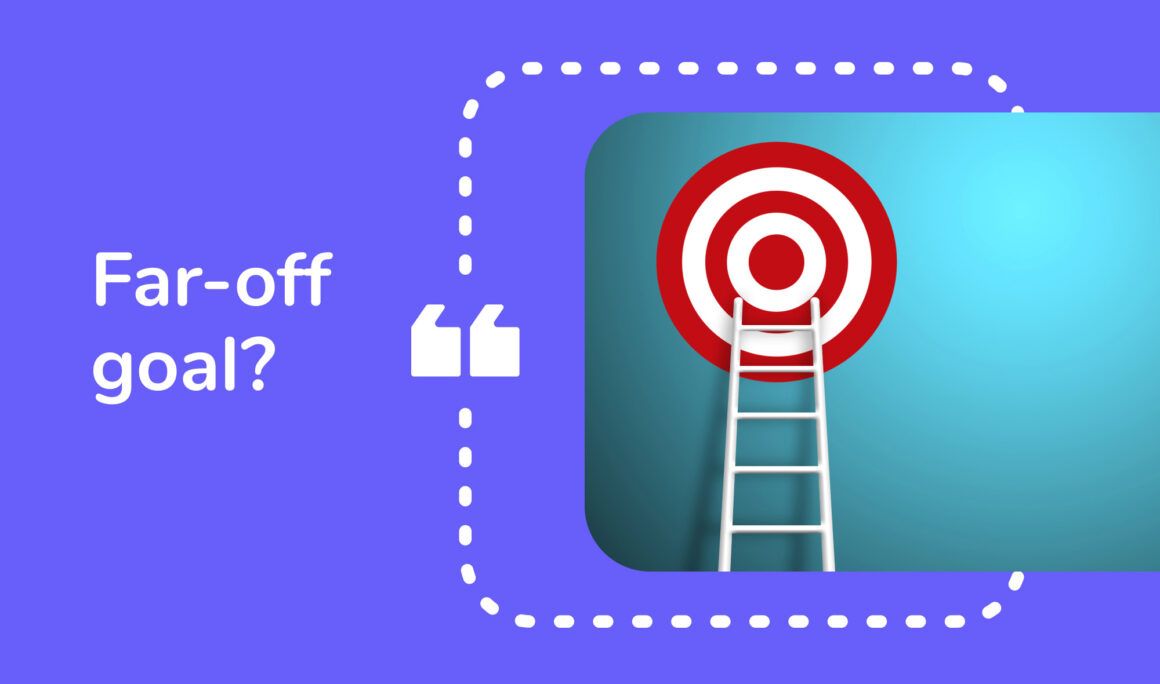
If you are approaching retirement age and feel restless or unfulfilled with your job, or are exhausted and burned out with the daily grind of your current career, it might be time to consider early retirement.
What are the 10 emotional signs you need to retire?

1. Feeling restless or unfulfilled with your job, or being bored or unsatisfied with what you are doing on a daily basis.
2. Experiencing a lack of energy or feeling burned out and exhausted from your career.
3. Losing interest in the things you used to enjoy outside of work, or not enjoying time with friends and family as much.
4. Experiencing other emotional or psychological symptoms, such as depression, anxiety, stress, or irritability.
5. Having difficulty focusing on your work or being less productive than usual.
6. Feeling disconnected from your colleagues or feeling like you have outgrown your current job.
7. Not feeling motivated or passionate about your work, or not identifying with the goals and values of your organization.
8. Feeling restless or eager to make a major change in your life, such as starting a new career or pursuing different interests.
9. Experiencing health issues related to stress, such as high blood pressure or weight gain.
10. Wanting to spend more time with your family, traveling, or pursuing other personal interests and hobbies.
If you are feeling any of these top emotional signs you may want to consider spending time with a career coach or financial planner to determine a game plan and if you are emotionally ready for retirement.
You feel your work-life balance is out of control

It's natural to feel restless and unfulfilled with your current job at certain points in your working life. But if these feelings continue for a prolonged period of time, it may be time to consider retirement. Before making any rash decisions, take a step back and give some careful thought to your career path so far.
Ask yourself the following questions: Are you still passionate about your work? Do you feel excited and energized by your job, or do you feel tired and burned out?
You feel like your job is taking a toll on your health
Other emotional signs that it may be time to retire include feelings of stress, anxiety, depression, irritability, or disconnectedness from colleagues and the organization you work for. You may also experience a lack of focus or motivation at work, feel restless or eager to make a major life change or experience health issues related to stress. Unlike younger employees, older employees can't take their physical health for granted and must seriously evaluate how stress from a job is affecting their health.
If you are experiencing any of these emotional signs, it may be time to start thinking about retirement. However, before taking this step, it's important to assess your overall situation and consider the practical considerations as well. Have you saved enough money for retirement? Do you have enough social support and life satisfaction outside of work?
You feel trapped by your job

To be sure, there are many people who stay in their jobs long after they're ready to retire simply because of financial concerns or other practical considerations. Staying in your job for such reasons is perfectly understandable. But if you don't enjoy work anymore or feel like you're staying out of a sense of obligation or unhappiness rather than true passion for what you do, it may be time to think about retiring.
Ask yourself the following questions: Is there anything new that you want to try in your career, or are you just settling for what is "good enough"?
You don't feel appreciated at work

One of the biggest factors that can contribute to job satisfaction is feeling appreciated for your work. If you don't feel valued or recognized by your boss or peers at work, it's only natural to feel unhappy and disengaged in your role. This can take a toll on your mental state over time, especially if you have been with an organization for decades.
However, it's important to take your financial situation into account as well-consider talking to a financial planner or career coach who can help you assess your options and make the best decision for your current position.
You struggle to deal with change at work
Change comes with the territory of any long-term career, and learning to adapt and thrive in a changing work environment is an important part of success. However, if you are unable or unwilling to deal with change at work, learn new job skills, or experience anxiety, stress, or other negative emotions in response to changes that affect your job-it may be time to consider retirement.
You are dreading work more and more each day

It's natural to experience some level of stress at work from time to time after all, there are always things that you can improve or change when it comes to your career. But if your mental health is affected and you find yourself dreading work more and more each day, or you feel tired and unhappy every time you walk into the office, it may be time to consider retirement.
You feel burned out from work

If you feel burnt out from your job, there's a good chance that you're no longer passionate about what you do. Burnout isn't just a physical response to stress-it's also a mental and emotional state of mind that can lead to unhappiness and disengagement in the workplace. Being burned out may be telling you that it's time to retire-but it's important to talk to a financial advisor or life coach who can help you weigh your options and make the best decision for your current situation.
Regardless of what you decide, remember that retirement isn't an end to your career-it's just the beginning of another chapter in your professional journey. Take some time to explore your options and envision what your golden years could look like.
You are feeling anxious about the future of your job security

Whether you're worried about economic uncertainty, changes at your company, or any other factors that could affect your job security, it's natural to feel anxious about the future. However, if this anxiety is affecting your work performance or leading you to experience negative emotions around work, it may be time to consider retirement.
If you've been putting off retirement for a while, it may be helpful to talk to a career counselor or coach who can help you explore your options and make informed decisions about the next steps in your career journey.
You feel you're not making a difference at your job
While it's important to be proud of your accomplishments at work and to feel a sense of purpose and fulfillment in what you do, if you're feeling like your job no longer makes a difference or that you can't make an impact in the workplace, this can be another indicator it's time.
It's also common for older workers to feel irrelevant as younger employees come into an organization. They also may worry about no longer identifying with who they are or what they do.
If these feelings are arising, it's a great opportunity to spend time with a career coach or counselor to see if you're ready for a new phase in life that can either be preparing for retirement or exploring new jobs.
You feel like retirement age is a far-off goal

If retirement age feels like it's a long way off, you may be less motivated to start planning for it. However, if you're ready to make a major life change now and have been thinking about retirement for some time, it may be the right choice for you.
Whatever your decision is, remember that retirement isn't the end of your career-it's just the beginning of another exciting chapter that will allow you to enjoy new hobbies, develop new job skills, or build a new social network.
So, is it time to retire? If you're feeling restless or burned out at work, tired or unhappy every time you walk into the office, or simply feel like it's time for a major life change, retirement may be the right choice for you. Talk to a financial advisor or career consultant today to learn more about your options and start planning for your future!
Emotional preparation for retirement
When it comes to retirement, there are many things to consider, including your financial situation, health and lifestyle goals, and emotional well-being. To emotionally prepare for retirement, it is important to take stock of where you are in terms of these factors and make any necessary changes or adjustments, especially if you are emotionally afraid to take the retirement leap.
One important step is to talk to your friends and family or a life coach about what retirement means to you. This can help you work through any emotional or mental barriers that you may be facing, and give you the support and guidance that you need as you plan for this major life transition.
Get financially fit

Reviewing your retirement account, finances, and credit card debt with a financial advisor can help you determine if you're financially fit and ready to retire. It's important to consider your financial situation and plan for how you will pay taxes during retirement. You can use a simple 401k calculator to assess your retirement finances more accurately. They can address any financial planning concerns you may have and help you determine your own retirement date.
It's also important while in the pre-retirement stage to start preparing for your retirement lifestyle. It's a great time to determine your retirement savings plan and budget then take into account how you spend money over a three to six-month period to see if you can live within your budget.
Finding a supportive community and expanding your social network is helpful. Retirement can be a major change, and having a supportive community to lean on can make the transition easier.
This can include expanding your social network by joining support groups or networking with other retirees who are on the same page or dealing with the same things. Seeking out professional counseling services to help you work through any emotional challenges that may arise as you plan for this new chapter in your life may be helpful too.
Retirement planning: how long does it take to adjust to retirement?
It's essential to understand how employer contributions can boost your retirement nest egg over time. There is no simple answer to this question, as the process of adjusting to retirement can vary from person to person. Some factors that may impact how long it takes to adjust include your personal financial situation, health, and lifestyle goals.
If you are concerned about managing your finances during retirement, it may be helpful to consult a financial professional to create a retirement plan that meets your needs and supports your new life. Additionally, it is important to focus on maintaining a healthy and balanced lifestyle, including engaging in regular physical activity and eating a nutritious diet.
What happens emotionally when you retire?

For some, the anticipation of retirement can be accompanied by a sense of excitement and relief. After years of working, many people feel ready to enjoy a more relaxed pace of life and take advantage of all that retirement has to offer. However, the transition into retirement can also bring up a range of emotions, including sadness, anxiety, and anticipation of retirement can be accompanied by a sense of excitement and relief knowing you have a lot more free time.
Anticipation
and excitement about what the future holds may also be present during retirement. It is important to take time to reflect on your life and goals and connect with others who share similar interests or hobbies. By embracing this new chapter in your life, you can find fulfillment and happiness as you embark on your new life.
Reconciliation
This can involve setting new goals and priorities, reevaluating your social and personal relationships with loved ones, or simply taking time to reflect on the past and look forward to the future with hope and optimism. Whatever path you choose, it is important to remember that retirement is an exciting time of change, growth, and new opportunities.
Imagination

The possibilities and potential that come with retirement can be both exhilarating and overwhelming. As you imagine what your retirement may look like, it is important to focus on setting achievable goals and staying true to yourself.
Whether you choose to travel, volunteer, or start a new career, remember to take time to enjoy the present moment and savor all of the joys and experiences that retirement has to offer.
Liberation
For many people, retirement represents a sense of freedom and liberation from the constraints of work or other obligations. It can be a time to pursue hobbies and your dreams and passions. It's an opportunity to live life on your own terms. As you adjust to this new lifestyle, it is important to stay true to yourself and focus on living in the present moment as you develop a new identity outside of your job or career.
Reorientation
As you transition into retirement, it is natural to feel disappointed at leaving a career, or experience feelings of confusion or uncertainty as you adjust to your new lifestyle. This process of reorientation can involve exploring new hobbies and interests, establishing meaningful connections with others, and finding ways to meaningfully contribute to your community.
So, am I ready to retire?

The best way to retire depends on your individual needs and preferences. There is no one "right" answer, as the decision of when or how to retire is a personal one. However, it is important to take time to reflect on your goals and priorities and consult with a financial advisor to ensure that you are making the best decision. The decision to retire is a personal one, and there is no single "right" way to do it. The most important thing is to take the time to reflect on your goals and priorities and consult with a financial advisor to ensure that you are making the best decision for your individual needs.
Conclusion

Whether you are determining the best age for retirement or already enjoying this new chapter in your life, it is important to approach this transition with a sense of openness and optimism, along with engaging in self-reflection questions.
By taking the time to reflect on your goals and priorities, setting achievable goals, and cultivating a positive mindset, you can create a fulfilling and rewarding experience during your retirement years.
Read more about: Executive Coaching
About Julian Lewis
Julian Lewis is a driven and accomplished professional with a passion for driving positive change in the business world. He is the co-founder and COO at Zella Life.
His own experience as a professional of color in a Fortune 500 company led him to discover the limitations for advancement that many professionals like himself face. Determined to reach his full potential, Julian became an established business coach and entrepreneur, committed to supporting others in their pursuit of personal and professional growth.
Today, Julian is a recognized corporate trainer, coach, and leader, known for his ability to leverage real-life experiences and evidence-based methodologies to affect positive change within individuals and organizations. As the leader of Zella Life's coaching division, he is dedicated to empowering individuals and businesses to achieve their full potential.